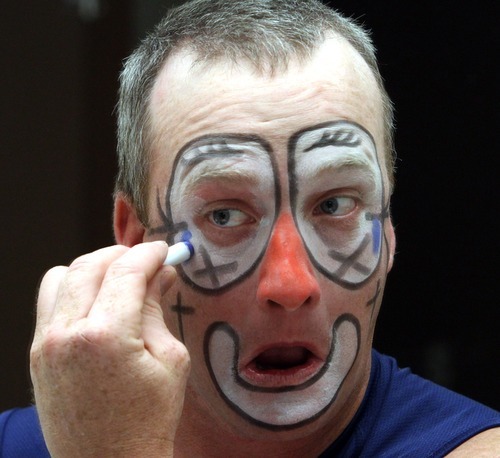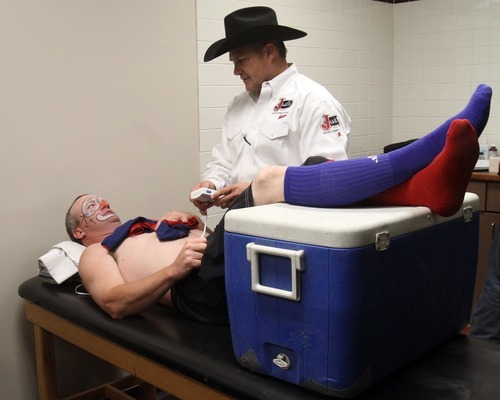This is an archived article that was published on sltrib.com in 2011, and information in the article may be outdated. It is provided only for personal research purposes and may not be reprinted.
West Valley City • They are the lifeblood of professional rodeo, fearlessly dedicated athletes who spend weeks at a time on the road and expose themselves to career-ending injuries — or worse — every time they step into an arena.
Not the bull riders.
The bullfighters, who are also known as rodeo clowns.
"They are the most important thing out there," says Tyler Gorham, a bull rider from Lebanon, Ore., who won Round 4 at the Days of '47 Rodeo on Friday night. "Without those guys, we wouldn't be able to go down the road. They get us out of there each and every time. Without them, we wouldn't have a profession. I shake their hand every night."
Rodeo clowns come from every corner of the globe.
At this week's Days of '47, the three men doing the dangerous but vital work were born in Oklahoma, Idaho and Australia.
They fight bulls — and save cowboys — because they love the sport, the lifestyle and the satisfaction of knowing that others can depend on them when needed.
Forget the baggy, brightly colored clothing that looks as if it was hurriedly purchased from a discount store.
Forget the zany makeup they wear, which is a concession to the entertainment aspect of their sport.
A rodeo clown's work isn't funny.
It's deadly serious.
"You know in the back of your head something [bad] can happen," said veteran bullfighter Dustin Brewer. "But whether you're a hockey player, football player, basketball player or whatever, you accept that. It's part of the job. You just grit your teeth."
At this year's Days of '47, the lineup of rodeo clowns includes Kelly Jennings, Phil Kropp and Brewer.
Jennings, who worked the 2008 National Finals Rodeo, was born, raised and still lives in Shoshone, Idaho.
Kropp is a 28-year-old native of Queensland, Australia, who now makes his home outside Ogden. Brewer was born in Elk City, Okla., but currently lives in Prairie du Chien, Wis., with his wife and two sons. Geography aside, Jennings, Kropp and Brewer have plenty in common.
All three started in rodeo as kids, and today, they can't imagine doing anything except fighting bulls for a living.
They love what they do.
"If you grow up in a family that rides motorbikes, you'll probably jump on a motorbike," Kropp said. "If you grow up in the country and ride horses, rodeo is part of the atmosphere. That's how it came about for me."
Said Brewer: "I started rodeoing when I was 6 years old — riding calves in the Little Britches Rodeo. I guess it progressed from there."
Jennings worked local amateur rodeos in Idaho before becoming a full-time bullfighter.
"Once I graduated to the professionals, it turned into a lifestyle like no other," he said. "You see the same guys all the time. They become your friends, and you like to help your friends."
The earliest rodeo clowns were hired to entertain fans between events and help work the livestock.
As early as the 1930s, however, improvements made in the breeding of the bulls used in rodeo changed the focus of their job. Gradually, it became apparent that the cowboys needed protection, so the clowns' task evolved.
They became the first line of defense against the larger, more athletic, more aggressive bulls that were finding their way into rodeo.
"Our job, pretty much, is to take care of the cowboys," Kropp said. "If they get in trouble, we get them out. That's our No. 1 priority."
Rodeo clowns distract the bull by making themselves the target. They attempt to draw the animal's attention away from the cowboy.
"Our main job is to be right there — once that bull rider gets bucked off or makes his ride," Brewer said. "You just do your best to get in that bull's face. That way, he sees you and not that bull rider."
By going nose to nose with a 2,000-pound bull, rodeo clowns purposely put themselves in harm's way, which explains why their job is so dangerous.
"I've busted my pelvis and spine," said Kropp, so casually that he might as well be discussing the weather.
"You get a lot of broken bones, bruises and cuts. That's just part of it."
Brewer has endured "four major surgeries," including one after he "took a horn in the neck back in 1991."
He has also broken his leg, torn up both knees and fractured his collarbone.
"People ask, 'Why do you keep going back?' " Brewer said. "But it's something you love, and [injuries] are something that you have to expect when you walk in that arena."
Jennings agrees.
"You're going to get beat up," he said. "You don't even worry about that. I had a bull step on my chest, split my sternum and break some ribs off my spine three years ago. … What are you going to do?"
The rodeo clown's appearance reflects his task.
The makeup used relates to the entertainment aspect of their job, but the brightly colored and loosely fitting clothes are worn with a purpose.
Bullfighters want the animals to see them, and they wear clothes that tear away easily, in case they get them tangled with the animal.
Rodeo clowns also wear football-type cleats for traction.
The last thing they need when engaging an irritated bull is to lose their footing.
"We can't have a bad day … because those guys depend on us," Brewer said. "Sure, we have a good time, but once those gates open, it's totally different. It becomes serious business."
The most dangerous situation a rodeo clown faces occurs when a cowboy slides underneath his bull.
"The feet hurt you more than the horns," Brewer said. "If the bull is stepping on him every jump, that's when it can get pretty serious."
Of course, there are times when a bullfighter can't prevent a rider from being injured.
When that happens, Brewer said, "We take it very personal."
Days of '47 Rodeo
Where • Maverik Center, West Valley City
When • Nightly (except Sunday) through Monday
Time • 7 p.m. Tickets • 801-988-8800
Prices • $5 to $47 Website • Daysof47.com
Inside • For Friday's results, see D9
Online • Photo galleries of the Days of '47 Rodeo. > http://www.sltrib.com/sports —
Friday's results
sadjglkjsdgSolum am dolorestia suntur sinvendunt offic tenimint autent id qui repra quisquo testio qui audit laut et as que rem fugia cus, a sint ut porum es ex ent volesciatur autat. Git, occus. Eraturiati quasper ovitia pa et volorep elecus. Et harum si vollab iligniendi restrum cullabo. Liquiam voluptas dolupisquam debis porendunt. Mi, cuscien istotaspicil ipsunto et fuga. Tem quaecat emporep tatur? Ga. Nequamuscium faccuptas commollore nobissi tatur, te volupti usciam quiatum noneces ciasped quiam voluptati accaectium num comnimincto vel estem sit dicatur, utem simin reptature volecus iliquis imusdaesto ipiet alite laborep erehendestia cum aliant dolut unt lis eum ea dolupta aliquo omni officitatia nonem raesti temporum ratum hici adi dolupta id et recum eat recab incipiet excepelent occus a et rem. Accatet utempor ionsequatur sitati ommolorro quamGa. Ihil im voluptat a quia nus elecea non.







